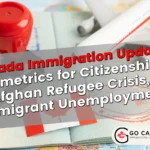August 2025 Canada updates: Poilievre proposes deporting criminal non-citizens, PGP faces scrutiny for contradictory policies, Bill C-3 raises citizenship concerns, and American refugee claims surge. Go Canada Services offers expert immigration support.
Canada August 2025 Immigration Updates: Poilievre’s Deportation Policy, Parents and Grandparents Program, Bill C-3, and American Refugee Claims
Poilievre’s Deportation Policy, PGP Contradictions Introduction
August 2025 marks significant shifts in Canada’s immigration landscape, with debates intensifying over criminal deportations, family reunification, citizenship reforms, and rising American refugee claims.
Conservative leader Pierre Poilievre proposes immediate deportation of non-citizen criminals, the Parents and Grandparents Program (PGP) faces scrutiny for contradictory policies, Bill C-3 raises concerns over citizenship integrity, and American refugee applications surge, driven by U.S. policy changes. These align with the 2025–2027 Immigration Levels Plan, targeting 395,000 permanent residents and 673,650 temporary residents in 2025.
Additional updates include Alberta AAIP draws, biometrics for citizenship, Afghan refugee crises, and immigrant unemployment. Go Canada Services, a trusted immigration firm since 2004, offers expert guidance.
This article addresses the user’s Arabic query on Poilievre’s deportation policy, PGP contradictions, Bill C-3, and American refugee claims, integrating broader immigration contexts and referencing provided web and X sources.
Poilievre’s Proposal for Deporting Criminal Non-Citizens
Conservative Party leader Pierre Poilievre announced a policy on August 20, 2025, to deport non-citizens who commit crimes in Canada, following his by-election win in Battle River-Crowfoot. Key details:
- Details: The policy targets non-citizens (temporary visa holders, international students, refugees) convicted of serious crimes (e.g., vandalism, violent protests), emphasizing immediate arrest and deportation. Poilievre seeks to increase Canada Border Services Agency (CBSA) funding and expedite processes under the Immigration and Refugee Protection Act (IRPA), which allows deportation for offences with 6+ months’ sentences. The plan aligns with his campaign to cap immigration at 250,000 annually, down from the Liberal target of 395,000 for 2025.
- Context: Public concern over immigration’s impact on housing and safety, reflected in a 2024 Abacus Data survey, supports Poilievre’s stance. Critics, including the National Council of Canadian Muslims (NCCM), warn of parallels to U.S.-style populism and risks to due process, citing Poilievre’s family history (his wife’s uncle, an undocumented immigrant granted residency). X posts from @JinglaiHe show mixed sentiment, with some praising safety measures and others decrying scapegoating.
- Impact: The policy could deter crime but risks targeting vulnerable groups (e.g., refugees) and eroding legal protections. Non-citizens should maintain clean records and seek legal counsel if charged to navigate IRPA consequences.
For legal or immigration support, contact Go Canada Services’ Contact Page.
Parents and Grandparents Program (PGP) Contradictions
The PGP faces criticism for contradictory treatment of migrant grandparents. Key points:
- Details: Research highlights that Canada values grandparents’ unpaid domestic labour (e.g., childcare) and cultural contributions but views them as economic burdens due to healthcare and social service costs. The PGP, part of family class admissions (24% of 2025 PR targets, or 94,800), and Super Visa program allow temporary visits but limit permanent residency. Upcoming cuts to family class admissions (to 90,000 by 2027) exacerbate tensions. Experts advocate recognizing grandparents’ contributions over liability-focused policies.
- Context: The Liberal government promotes family reunification as a “pillar” but prioritizes economic immigration (54% of PR targets). The Super Visa, allowing 5-year stays, saw 30,000 approvals in 2024 but lacks PR pathways. X posts from @MigrantRights urge structural reforms for fairness.
- Impact: Reduced PGP admissions may delay reunification (current wait times: 24–36 months). Sponsors should prepare strong applications (proof of income, family ties) and consider Super Visas as interim solutions.
For PGP or Super Visa support, explore Go Canada Services’ Family Sponsorship Services.
Bill C-3 Citizenship Reforms and Concerns
Bill C-3, introduced by the Mark Carney government, aims to restore citizenship for foreign-born children of Canadians but raises concerns. Key insights:
- Details: The bill addresses the 2009 first-generation cutoff, declared unconstitutional, by allowing second-generation Canadians abroad to claim citizenship with 1,095 days of physical presence in Canada, without a timeframe limit. Experts warn this open-ended provision complicates verification, risking fraud and “citizenship of convenience” for millions abroad. Critics argue it creates unequal citizen classes and raises sovereignty concerns amid foreign interference risks (e.g., CSIS’s 538,000+ screening backlog).
- Context: IRCC processed 300,000 citizenship applications in 2024, with 12–18 month wait times. Bill C-3 aligns with Canada’s inclusive identity but faces scrutiny for administrative feasibility. X posts from @CBCPolitics note public debate over “Lost Canadians” and verification challenges.
- Impact: Eligible applicants should document Canadian ties and physical presence early, as IRCC may tighten rules post-2026. Those abroad should monitor CSIS screening updates to avoid delays.
For citizenship support, visit Go Canada Services’ Permanent Residency Services.
Surge in American Refugee Claims
American refugee applications to Canada are rising, driven by U.S. policy shifts. Key findings:
- Details: The Immigration and Refugee Board reports 245 American refugee claims in the first half of 2025, surpassing 2024’s total. Many are transgender individuals fleeing restrictive U.S. policies under President Trump, echoing trends from 2017–2020. Claims remain a small fraction of Canada’s 55,000 total refugee applications in 2025, with a 73,450-case backlog.
- Context: The U.S.–Canada Safe Third Country Agreement limits claims at official crossings, pushing irregular entries (e.g., Roxham Road, closed 2023). X posts from @Betar_USA highlight transgender inquiries, with 60% of claims citing persecution. Canada’s 2025–2027 plan allocates 59,250 PR spots for refugees, but processing delays (6–12 months) persist.
- Impact: Claimants should provide robust evidence of persecution (e.g., legal documents, threats) and seek legal aid to navigate backlogs. Canada’s humanitarian commitment remains strong, but capacity constraints may limit approvals.
For refugee claim support, contact Go Canada Services’ Free Assessment.
Other Key Updates
- Alberta AAIP Draws: 683 invitations (August 7–12): 63 Healthcare Express Entry (CRS 56), 39 Healthcare Non-Express Entry (score 53), 581 Opportunity Stream (score 70).
- Biometrics for Citizenship: Mandatory fingerprints and facial recognition start 2026–2027 ($85–$170).
- Afghan Refugee Crisis: 3,000 Afghans in Tajikistan face deportation; IRCC works with UNHCR.
- Immigrant Unemployment: Recent immigrants face 11.2% unemployment vs. 6.2% for Canadian-born (July 2025).
- Canadians in ICE Detention: 150 detained since January 2025, including toddlers, with 56 still in custody.
- Undocumented Residents: Economists urge including 500,000 in 2025–2027 planning.
- Conservative Legislation: Fall 2025 Criminal Code amendment to end sentencing leniency for non-citizens.
- TFWP Tensions: 20% cut in approvals (85,000 in 2025) sparks labour shortage debates.
- Express Entry Medical Exams: Mandatory upfront exams start August 21, 2025 ($140–$280).
- Newfoundland Draws: 231 invitations on August 13 (180 NLPNP, 51 AIP).
- Data Transparency: Carney administration withholds data since May 2025.
- Refusal Rates: Study permits (65.4%) and visitor visas (50%) face high refusals amid 2.19 million backlog.
- Saskatchewan Job Growth: 22,200 new jobs, 5.0% unemployment, boosting SINP.
Immigration and Settlement Strategies
- Non-Citizen Offenders: Maintain clean records; seek legal counsel if charged to navigate IRPA deportation risks (6+ month sentences).
- PGP Applicants: Prepare strong sponsorship applications (income proof, family ties); consider Super Visas for temporary reunification amid PGP cuts.
- Bill C-3 Applicants: Document 1,095 days of physical presence with records (e.g., leases, employment); monitor IRCC’s 2026 verification rules.
- American Refugee Claimants: Compile persecution evidence (e.g., U.S. legal restrictions, threats); engage legal aid or UNHCR to expedite claims.
For tailored strategies, start with Go Canada Services’ Free Assessment.

Frequently Asked Questions
- What is Poilievre’s deportation policy for non-citizens?
Announced August 20, 2025, it mandates immediate deportation of non-citizens committing serious crimes, with increased CBSA funding, aligning with a 250,000 immigration cap. - Why is the Parents and Grandparents Program contradictory?
It values grandparents’ childcare and cultural roles but views them as economic burdens, limiting PR access amid planned family class cuts (90,000 by 2027). - What are the concerns with Bill C-3?
The bill allows second-generation Canadians abroad to claim citizenship with 1,095 days of presence but lacks a timeframe, risking fraud and administrative challenges. - Why are American refugee claims to Canada surging?
245 claims in 2025 (vs. 2024’s total), driven by transgender Americans fleeing restrictive U.S. policies, with a 73,450-case backlog slowing processing.
Why Choose Go Canada Services?
Go Canada Services excels in navigating Canada’s immigration pathways, offering solutions for Permanent Residency, Work Permits, Study Permits, and Family Sponsorship. Their regulated consultants ensure compliance with IRCC and provincial requirements. Start with a Free Assessment or contact them at Go Canada Services’ Contact Page.
Call to Action
Begin your journey to Canada with Go Canada Services. Schedule a consultation for immigration, work, or settlement support. Satisfied with their services? Leave a review on Google.


